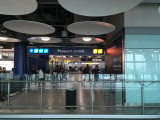
The United Kingdom and Turkey have reached a new accord aimed at dismantling people-smuggling syndicates and combating unlawful migration.
This collaboration encompasses the establishment of a "center of excellence" within Turkey, dedicated to enhancing cooperation and bolstering intelligence sharing among law enforcement agencies.
The British government has outlined that this initiative will hinder the flow of small boat components across Europe, thereby disrupting the supply chain of illicit trafficking operations.
However, it should be noted that this agreement does not involve the return of unsuccessful Turkish asylum seekers.
Immigration Minister Robert Jenrick, who recently visited Turkey, stated that this partnership is underpinned by financial support. Although he refrained from specifying the exact amount, he informed GB News that the focus is not primarily on monetary contributions, but rather on information sharing.
How Many People Cross the Channel in Small Boats? How is the UK Preventing Channel Crossings? The new "center of excellence," to be established by the Turkish National Police, will facilitate the exchange of intelligence between the two countries, enabling prompt action based on information received.
Furthermore, the government has disclosed its plans to deploy additional officers to Turkey, fostering collaboration between personnel from the National Crime Agency, the Home Office, and their Turkish counterparts.
A memorandum of understanding has also been agreed upon to expedite the sharing of customs data and intelligence.
The Home Office has highlighted that the illicit export of small boats and associated parts throughout Europe, facilitating unauthorized crossings, constitutes a pivotal element of smugglers' strategies. It is estimated that numerous parts, amounting to hundreds, are transported annually for this illicit purpose.
In the initial seven months of this year, 1,486 Turkish citizens crossed the English Channel to reach the UK via small boats, making them the second most prevalent nationality in such crossings, trailing behind Afghans, according to Home Office statistics.
The influx of Turkish nationals has been on a gradual upswing since the previous year, exacerbated by a catastrophic earthquake in February that left around 1.5 million people homeless. Furthermore, Turkey is grappling with a worsening economic crisis, with inflation hovering at nearly 50%.
In 2022, the UK repatriated 191 Turkish nationals, with 1,076 having arrived via small boats. However, a formal repatriation agreement between the two countries is lacking.
Mr. Jenrick affirmed that the UK is collaborating closely with Turkey to facilitate the return of Turkish nationals and streamline associated processes.
While the European Union has an accord with Turkey to repatriate migrants crossing into the bloc from the country illicitly, the UK is no longer a participant in EU returns agreements following Brexit.
Mr. Jenrick noted that although the UK aims to collaborate with the EU, returns agreements were not particularly effective during the UK's EU membership.
Yvette Cooper, Labour's Shadow Home Secretary, called for an all-encompassing new agreement involving the EU, France, neighboring nations, and enhanced security cooperation within Europe.
Home Secretary Suella Braverman commented, "We are resolute in our commitment to dismantle people smuggling networks and put an end to illicit crossings. Our partnership with Turkey, a trusted ally, will empower our law enforcement agencies to join forces in addressing this global issue and disrupt the supply chain of small boats." Photo by Chris McAndrew, Wikimedia commons.







































